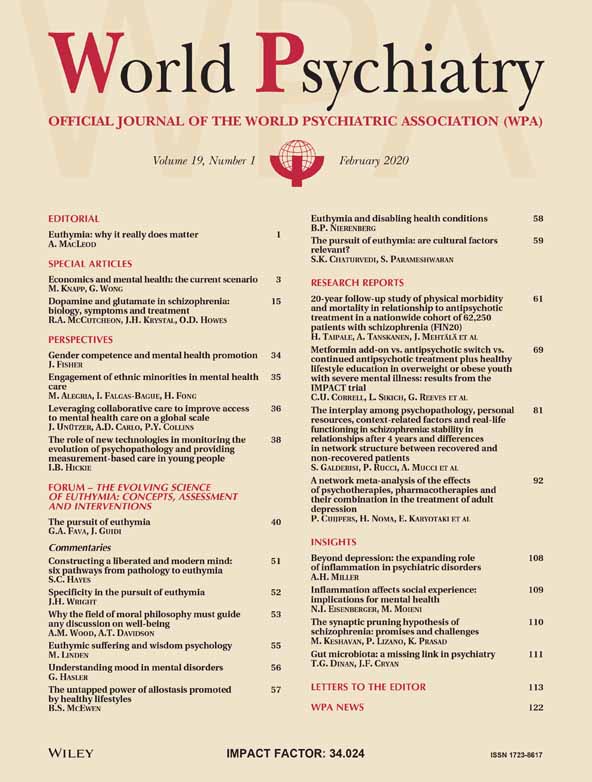The WPA Education, Science, Publication, and Research Initiative (ESPRI): jumpstarting scientific projects in low- and middle-income countries
The WPA's core mission is to promote the advancement of psychiatry and mental health all over the globe. Fostering an environment enabling state-of-the-art learning and research is an integral part of the WPA's toolbox to achieve that mission.
At the level of WPA Executive Committee, the Secretaries for Education, Scientific Publications and Scientific Sections closely collaborate to build and maintain that environment1. Hence, a new signature project of the WPA, the Education, Science, Publication, and Research Initiative (ESPRI), initially proposed and conceptualized by the Secretary for Scientific Sections and further developed and fully endorsed by all members of the Executive Committee, has now been launched as a joint initiative to stimulate groundbreaking education, publication and research projects in low- and middle-income countries (LMICs).
Results from the EMERALD project on emerging mental health systems in LMICs have alerted the global psychiatric community to the various challenges to sustainable mental health services, knowledge transfer and research2, 3. But they have also highlighted how well-coordinated networks of stakeholders, capacity building activities, and dissemination can bring about change.
WPA's ESPRI is meant to stimulate the scientific aspects of these networks. Knowing that the low level of funding accorded to mental health in LMICs is a major impediment to putting promising ideas into practice, ESPRI aims at jumpstarting projects by providing seed funding to research groups.
These projects should ideally be integrated with and help further develop the respective educational setups4-6. Applicants are invited to propose any kind of research project they would like to get off the ground. Projects may be on any subject, ranging from epidemiology to biology or ethics. They may entail sophisticated experimental work or be primarily literature-based research projects that the WPA will be happy to share with the psychiatric community at large7, 8.
The proposed projects should ideally be in line with the current WPA Action Plan9 and be coordinated in close collaboration with any or several of WPA Scientific Sections. Whenever feasible, the WPA encourages its Collaborating Centers to lend support to an ESPRI proposal. Intersectional efforts and the involvement of early career psychiatrists are highly encouraged. While we welcome an active role by researchers from non-LMICs in the proposed projects, we request that principal investigators on an ESPRI application be mainly based at an LMIC institution.
At this point, the WPA has set aside a sum of US $15,000 to be awarded to three projects annually, with the first projects selected by the end of 2019. The Executive Committee is cognizant of the fact that an initial sum of $5,000 may not be sufficient to implement a large-scale or long-term project and, hence, will work towards securing more funding in the future. However, the underlying idea of ESPRI is not to provide comprehensive funding, but rather to seed money to jumpstart a pilot project or proof-of-concept study.
The ESPRI seed funds are meant to be matched by funds the applicants have been able to secure through their respective institution, national and/or international funding organizations, governmental agencies, non-governmental organizations, and/or industry. These matching funds do not necessarily have to be cash, but may also be in-kind services like staff, space or logistical support that is equivalent to at least US $5,000.
The idea of accepting in-kind matching funds in lieu of cash support was developed in discussions with psychiatrists from Africa at the WPA Regional Congress taking place in Addis Ababa, Ethiopia in November 2018, taking into consideration the scarce financial resources in LMICs. Also, securing matching in-kind funds will require activating the aforementioned stakeholder networks and will thus be in and by itself an added value for the advancement of mental health infrastructures in the respective country or region.
As the WPA strives to minimize the logistical burden for applicants, we have introduced a straightforward application procedure. Applicants for an ESPRI award are asked to provide a one-page proposal outlining their project idea, a two-page curriculum vitae of each principal investigator (for a total of up to five), proof of matching funds, an endorsement by the Chair of at least one WPA Scientific Section, and an approval of a local research ethics committee, if applicable.
Until a page for ESPRI is added to the WPA website, the application package should be submitted via e-mail to the WPA Secretariat. The project should be completed within three years starting from the release of the funds. Yearly reports must be submitted outlining the progress of the study and the extent of funding being used. Publications based on the research results should acknowledge the funding provided by the WPA.
Proposals will be evaluated by a review committee including up to ten members drawn from WPA Scientific Sections. Applicants whose proposals are not selected for funding will be encouraged to resubmit a revised proposal if recommended by the committee.
The WPA Executive Committee looks forward to receiving a good number of high-quality proposals showcasing the innovative potential of psychiatrists and mental health experts in LMICs. We truly believe that research in LMICs and on LMIC-related topics should be initiated and carried out by researchers with a deep knowledge of the respective country or region or who are based in the region.
WPA's new signature program ESPRI is geared toward these researchers. It is meant to minimize, if not overcome, initial infrastructural, logistical or financial barriers. We are also hopeful that ESPRI will draw the attention of private or corporate donors, interested in supporting state-of-the-art global mental health research beyond the traditional and well-funded research institutions in high-income countries.




